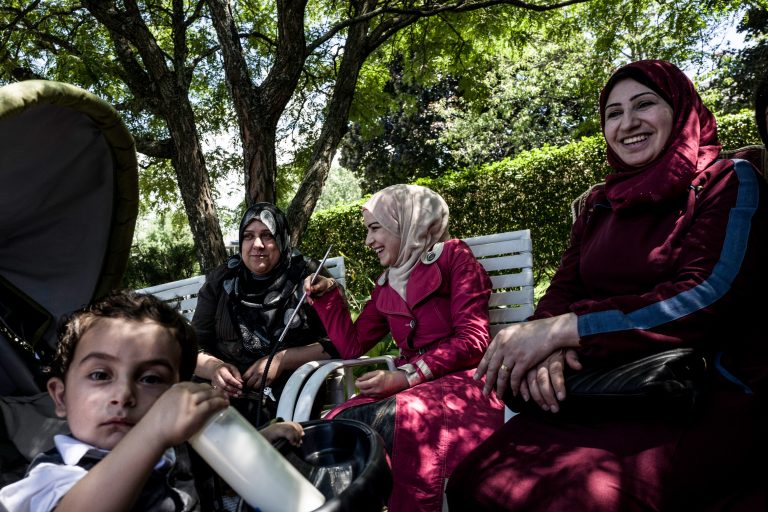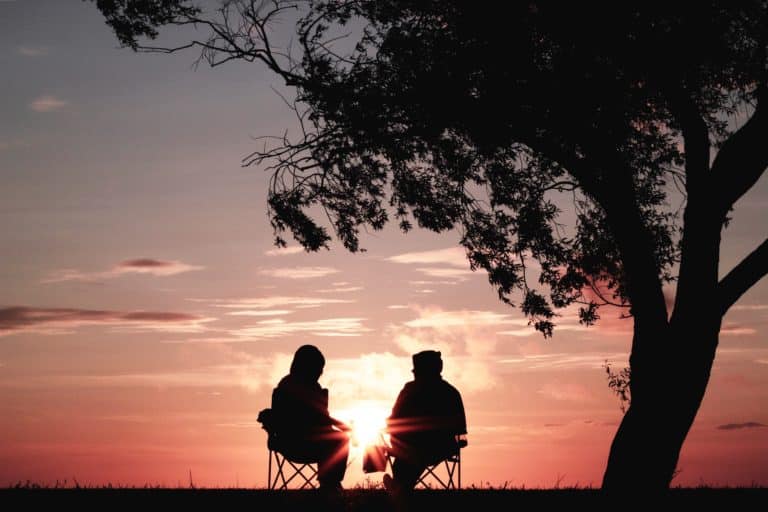
Image by Andrew Renneisen/Getty Images, © All Rights Reserved.
Celebrating Eid in Our Fractured World
Ramadan is coming to an end, and for the first time I find myself in an indulgent mood toward the inevitable squabbles within the global Muslim community on moon sighting. Will Eid, the holy day that marks the end of a month of fasting, fall on Friday for both camps this year? There are those who allow that NASA, with its sophisticated astronomical tools and calculations, can decide the onset of the new lunar month, and there are those who insist a human must physically witness the new moon. Every year it is a toss-up whether someone will sight the moon right on NASA’s predetermined birth day.
Within my own sprawling extended family, we have another set of squabbles to coordinate: the Eid brunch-feast, Eid prayer time, where to meet, and how to juggle our multiple obligations to separate sets of in-laws with kids in tow.
But this year, I find myself excited to go buy new Eid clothes for the kids, even though I hate shopping. I am considering decorating my hands and feet with henna, even though my schedule may not allow it. I want to “Eid” clean the house and start preparing a menu for the brunch I would like to insist on hosting, even though my siblings seem ambivalent.
For me, these preparations are welcome distractions from the weightier matters confronting us in America today and the strident turn our politics have taken. I am alarmed at the escalating violence bubbling out of our discourse and spilling into our reality: children stolen from parents in detention centers; other children being shot at in schools; unarmed Black men being shot at in the streets; people of all races already struggling to make ends meet being routinely dispossessed of their healthcare, basic sustenance, and security. It seems when our dialogue loses nuance, society in turn loses its mind. It’s the most vulnerable of our population that get hit the hardest: the children, “the tired, the poor, the huddled masses yearning to breathe free.”
This year, I find myself turning my gaze beyond these excruciatingly exhausting last days of Ramadan and the incessant firehose of tragic news to the dawning of Eid and the swell of colorful gatherings in mosques. In America, we are blessed to congregate with a breathtaking diversity of people from all around the world. The regal Senegalese women in their fancy head-gear and flowing boubous; Pakistani women with riotous shiny dupattas; Sudanese women with their dark kohl eyes and intricate black henna on their hands and feet; African American women with their stylish wraps and hip dresses; Nigerians, Egyptians, Malay, Somalis, Iraqis, and the scroll continues to unfold, displaying a dazzling map of the whole world.
For Eid and the sake of all that is holy about the day, I choose to momentarily suspend my knowledge of the serious intra-community issues we contend with, moon sighting debates being the least of it. I love to lean in and eavesdrop on the rise and fall of different accents and tongues; inhale the mingling scents of the floral, oud, bukhoor, heavy musk; and let my puny, individualistic drop of a self be overwhelmed by the powerful collective ocean of my people.
In these spaces, I realize that even words like “America” and “American” can’t be contained within these borders; we spill over into various nationalities, tongues, and norms. To reflect on the travel ban in this context is to understand this specific, cruel brand of violence our current administration seems to favor: tearing apart families and loved ones.
This Ramadan, although I didn’t exactly unplug, I found myself seeking respite in its constraints. Maybe it’s the willful act of not eating or drinking for 16-hour days that presses the giant mute button on the world’s chaos. I just don’t have the spare energy for outrage over each scandal that hits social media. I am more conscious about what I choose to pour myself into. Lingering in my garden as I turn the soil; tugging at weeds and marveling at how my fingers hold a magnetic resonance to the rich earth; deliberately seeking moments of aimless play with my young children; finding solace in the cathedral of large trees in my backyard; sinking into the tingling sensation of dewy grass on my bare feet. Grounding myself to savor tiny bites of joy in the face of all that threatens to uproot us feels like an act of resistance too.
This Ramadan, I found myself drawn to the spaciousness within me that was previously numbed by food. While it’s easy to conceive of the apparent virtues being embodied — fasting, sacrifice, charity, and extending prayers into the night — what I have begun to trace is the genesis of how I embody my vices. The swell of resentment that begins with a festering in the bottom of my chest when I push myself to keep moving beyond my body’s protests in aches and pains. The tightness in the softness of my belly and the rapid shallow breathing that presages an angry outburst. The lightning sharp pierce of my fleshy heart when I fall into reflexive envy. The vice is not in the sensation itself, for the body is just having her say. The vices are born out of my resolute deafness to my body’s language, stopping only when it spills over in reactivity, outburst, anxiety, and learned helplessness.
I wonder what happens to the seething wilderness and tangles of unspoken tales that lie buried in the deep folds of my body when I routinely refuse to listen to her shallowest of small talk?
This Ramadan, I find myself calling on Al-Lateef — one of God’s Names that denotes subtlety, grace, gentleness. My limbs are heavy with exhaustion, and yet I feel an imperceptible lightness that carries me through my days and nights.
I find it easier to overcome my hesitation and reach out to my neighbors, sending a plate of appetizers across the street, condolence to the family of the deceased two doors down, or working on the HOA’s social committee to create a “neighbor cares” network. These small offerings end up opening floodgates of generosity: the heaping plates of food that come back, the older neighbor who offers a brand new leaf blower to encourage my boys’ lawn mowing business, the other one around the block promising cuttings of her flowers for me to plant. I find myself dawdling in these last days, savoring wordless revelations that I have yet to rationalize and dilute with forced narrative.
For the sake of my children, I tilt my chin toward the festivities of Eid, for I know that for resistance to endure we must consciously choose to take our inner squabbles, messy logistics, joyful celebrations, multicolored coats/skins and occupy public spaces owning our right to just be.
This essay was originally published in The Rumpus. It is reprinted here with permission.
